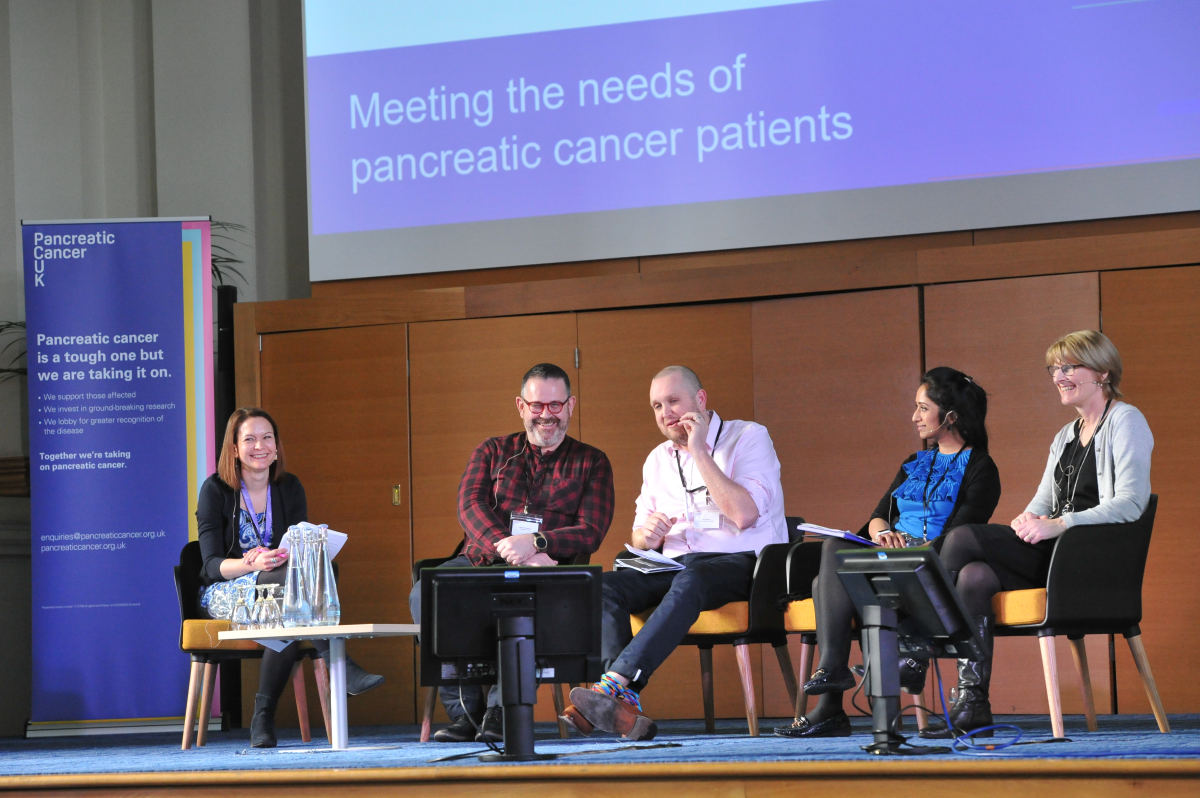Every October we hold our National Study Day, bringing together health professionals from around the country to learn about the latest developments in pancreatic cancer.
This year, in light of everything going on, we brought everyone together at a variety of free virtual sessions across the month exploring how we can improve patients’ experience through treatment, dietetic management and emotional support.
SABR: The Latest Development in Radiotherapy, Monday 5th October 2020, 13.00 – 14.00
Watch the session and view the slides
Dr Ganesh Radhakrishna, Consultant Clinical Oncologist at The Christie Hospital explored how Stereotactic Ablative Body Radiotherapy (SABR) can be used for locally advanced unresectable pancreatic cancer. He looked at the principles and practice of SABR, evidence base for SABR in pancreatic cancer and future developments on the horizon.
Suitable for all health professionals, from Oncologists and Surgeons to Clinical Nurse Specialists, with an interest in hearing about Stereotactic Ablative Body Radiotherapy (SABR) and what this could mean for their patients
ESPAC-5 and neoadjuvant chemotherapy, Thursday 8th October 2020, 09.00 - 10.00
Watch the session and view the slides
Paula Ghaneh, Professor of Surgery at the University of Liverpool shared the findings from the ESPAC-5F trial and the impact of neoadjuvant chemotherapy followed by surgery compared to immediate surgery. Nigel Jamieson, Pancreatic Surgeon at the Glasgow Royal Infirmary then shared his experience of how neoadjuvant chemotherapy works in practice. We then heard from Elizabeth Connell who kindly shared her personal experience of neoadjuvant chemotherapy at the Glasgow Royal Infirmary.
Suitable for all health professionals with an interest in hearing about the ESPAC-5 trial findings on neoadjuvant chemotherapy and what this looks like in practice
Dietetic Management and Pancreatic Cancer – An Introduction, Tuesday 13th October 2020, 09.00 - 11.00
Watch the session and view the slides
This introduction to dietetic management in pancreatic cancer gave attendees a grounding knowledge and understanding of:
- Pancreatic cancer and how patients present
- Malnutrition and pancreatic cancer
- The symptoms of Pancreatic Exocrine Insufficiency (PEI)
- The treatment of PEI including Pancreatic Enzyme
- Replacement Therapy (PERT), managing diabetes and enteral feeding
Suitable for Nurses and other Health Professionals looking for a grounding knowledge and understanding of dietetic management in pancreatic cancer
Dietetic Management and Pancreatic Cancer for Non-Specialist Dietitians and Specialist Nurses, Wednesday 14th October 2020, 14.00 - 16.00
Watch the session and view the slides
This dietetic management in pancreatic cancer session provided attendees with a greater knowledge and understanding of:
- The nutritional assessment in pancreatic cancer
- Pancreatic Exocrine Insufficiency (PEI) and Pancreatic Enzyme Replacement Therapy (PERT)
- Nutritional Management in pancreatic cancer including pre- and post-surgery, enteral feeding and stents
- Diabetes and pancreatic cancer with a focus on Type 3c diabetes
Suitable for Non-Specialist Dietitians and UGI/HPB Clinical Nurse Specialists looking for a more in-depth knowledge and understanding of dietetic management in pancreatic cancer
Panel Discussion and Sharing Session: Providing Emotional Support During COVID-19 and Beyond, Tuesday 20th October 2020, 15.30 - 16.45
In this panel session we heard from a range of nurses sharing their experience of providing emotional support to their patients and their families under COVID-19 restrictions such as telephone clinics, breaking bad news and wearing PPE. We then split into smaller groups to share and discuss our own experiences, challenges and approaches.
Suitable for all health professionals who are interested in hearing from a range of nurses on how they have been providing emotional support under COVID-19 restrictions
If you have any questions, please get in touch with us at hpnetwork@pancreaticcancer.org.uk
The National Study Sessions are kindly supported by

